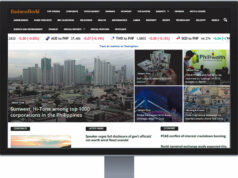On redefining the future of business
By Bjorn Biel M. Beltran, Special Features Writer
In fast-changing times, it is the responsibility of leaders and visionaries to redefine what it means to contribute to society and prepare for the coming future. The landscape of Philippine business particularly has vastly changed with the impact of emerging technologies coinciding with the rise of a new generation of workers.
With technology having a bigger role in changing the way firms do business, success has become a matter of leveraging emerging fields like automation, artificial intelligence (AI), data analytics, blockchain, the Internet of Things, among many others. It is now becoming more crucial to have a deep and nuanced understanding of their intended and unintended impact.
It is to this goal that BusinessWorld, the most read and most respected business newspaper in the Philippines, once again held its annual BusinessWorld Economic Forum in the Grand Ballroom of Grand Hyatt Manila in Bonifacio Global City, Taguig City on May 31.
Already on its fourth year, the forum has become the country’s most anticipated event for gathering thought leaders, industry experts, business executives, government policy makers, innovators, academicians, technology providers and more to discuss the myriad realities and concerns that are transforming the landscape of Philippine business. This year, more than 700 high-level attendees came together to explore the theme, “The Future of Business: Next-Wave Disruptions & Opportunities,” highlighting the promises and dangers of technology and how these will impact businesses over the next 10 years.

Leading the discussion is Jaime Augusto Zobel de Ayala, chairman and CEO of Ayala Corp. As head of one of the oldest and largest conglomerates in the Philippines — one that has interests in a wide spectrum of industries like retail, education, health care, management, automotive, energy, and banking — he shared his insights on the changing times and underscored the importance of vigilance amid such disruption.
“Here in the Philippines, there seems to be a pervasive mind-set that industries may be slower to change, or that disruptions will hit us a little bit more gradually,” he said in his keynote address.
“However, if you look at industries like e-commerce or FinTech, the pace of change in telecommunications, and how the rise of technologies and new players have changed the landscape dramatically in the past decade alone, you’ll see that change is happening here as quickly as it is anywhere else. And if one doesn’t accept that, you really have a good chance to be left behind.”
Mr. Zobel de Ayala presented examples of how Ayala Corp. is leveraging innovation to create opportunities for the company as it moves forward into the future, through investments, the constant monitoring of trends and technologies, and nurturing a skilled and collaborative environment.

“Now more than ever, in many ways for all of us in the business environment, the private sector can no longer be reactive. Companies that don’t innovate really run the risk of becoming irrelevant in our market. We need to be proactive in finding gaps in our current systems, even when it means that we have to be the ones disrupting ourselves,” he said.
Following Mr. Zobel de Ayala was a series of talks on the impact of automation and artificial intelligence on people, skills, and management. Opening the session was Kristine Romano, managing partner of McKinsey & Company Philippines, who explored how the job market will be changed, rather than be displaced by, emerging technologies.
Ms. Romano proposed that as technologies such as AI and robotics become more sophisticated, workers would need to learn new cognitive skills in order to adapt. Rizalina G. Mantaring, president of the Management Association of the Philippines, followed it up with her talk about defining management and leadership in a workplace wherein both humans and robots cohabitate.
In this new workplace, skills are the primary currency. That is according to Susie Lee, vice-president of Global Business Solutions at education technology firm Degreed. A new set of skills would be needed to navigate the problems and obstacles of the future — exactly the kind that the newest generation of workers, the Gen Z, are equipped to face. Pauline G. Fermin, managing director of Acumen Strategic Consulting, Inc., urged companies to welcome this new generation and adopt to their tech-centric worldview to effectively build the needed capabilities of the future.
The following session discussed the unstoppable growth of digital commerce, and how big data and mobile technology can shape the future of retail. Shiv Choudhury, partner and managing director of Boston Consulting Group Singapore, shared his strategies for retail through adopting agile, democratized technology, utilizing e-commerce and analytics, and ensuring a personalized, omni-channel experience for consumers.
Globe Telecom Senior Vice-President for Enterprise Group Peter D. Maquera, meanwhile, identified the opportunities presented by big data and mobile technology in retail by providing statistics on the sustained growth of Filipino mobile users and the data they are willing to provide companies in exchange for services like e-commerce and delivery. Lazada Philippines CEO Ray Alimurung, in his talk about New Retail, said that Southeast Asia is currently the “battleground” in e-commerce, with the industry growing to about $240 billion by 2025.
Mr. Alimurung welcomed the early age of New Retail, and encouraged innovators to explore concepts like livestreaming, offline to online capabilities, and gamification to provide new and better experiences to consumers. Such innovation is also needed in the area of logistics, Entrego Philippines President Constantin Robertz said, as the industry is undergoing an explosion brought about by e-commerce and mobile delivery. Digital transformation, he said, is changing the requirements of traditional business supply chains, and he believes that logistics is an industry ripe for rapid transformation.

Also in need of innovation and commitment is the industry of automobiles. In an era of climate change, sustainability is a more important goal than ever. Toyota Motor Philippines President Satoru Suzuki envisioned the future of mobility as he presented his company’s plans to become a more sustainable company by 2050. Toyota’s measures include shifting to electric vehicles, reducing carbon emissions, water wastage, and utilizing renewable energy in its production cycle.
“Toyota continuously strives to implement the appropriate measures towards this cause, ever exceeding customer expectations, enriching lives and commitments. By doing so, we’ll be able to achieve sustainable mobility for all,” Mr. Suzuki said.
To explore financial technology and the future of money, Frost & Sullivan, Asia Pacific Managing Director and Partner Shivaji Das highlighted social, regulatory, technological, and business model trends driving change in the banking sector worldwide. Trends like virtual banking, augmented reality, cloud computing, cognitive security, and analytics are pushing banks on the path towards a digitized future. Noel A. Santiago, chief digital officer of the Bank of the Philippine Islands, contextualized such trends and changes, exploring what such digital transformation means for local banks. He suggested that banks should work with financial technology start-ups who are fluent in these emerging technologies, and leverage their skillsets for a mutually beneficial partnership.
Lito Villanueva, founder of FinTechAlliance.ph, extolled the benefits of a cashless economy, illustrating how it might empower the unbanked and underbanked sectors and engender financial inclusion, after which Bangko Sentral ng Pilipinas Senior Director and Officer-in-Charge for Financial Technology Vicente T. De Villa III followed up with a talk on how financial institutions can utilize technology to fortify their future.

The final session of the Economic Forum further delved into the promises of the future, as it focused on the next generation of technology and how the future of the economy can change the world. Launching the discussion was Alliance Global CEO Kevin Andrew Tan, who shared his company’s insights on the trends of tomorrow. Ever more connected by technology, Mr. Tan said that society will also change shape accordingly, bringing forth a society that is always on-demand and is driven more by community and shared values.
Andrés Ortola, country general manager of Microsoft Philippines, envisioned a future wherein AI will empower the productivity and the imagination of the workforce, accelerating the rate of innovation even further. Maria Francesca F. Tan, CEO of the MFT Group of Companies, expanded on this by discussing which industries are most likely to see such changes sooner rather than later, and what the role of private equity will be in this new, unknown world.
Jojo Gendrano, PLDT Enterprise first vice-president & head of Enterprise Core Business Solutions, explored the horizons of the connected age. Finally, Aileen Judan-Jiao, president and country general manager of IBM Philippines, capped off the forum with an in-depth look into the future of technology, her predictions on the next wave of disruptive technologies, and how they will yet again change life as we know it.
The BusinessWorld Economic Forum 2019 was presented by BusinessWorld Publishing Corp., with co-presentors LT Group, Inc., Entrego, and GT Capital; sponsors: (Platinum) Megaworld, PLDT, Toyota, and Lexus; (Gold) Ayala, BDO, Federal Land, MFT Group, Metro Pacific, San Miguel Corp., SM Investments Corp., and Turkish Airlines; (Silver) Aseana City, FWD, Globe, Meralco, and RCBC; and (Bronze) Aboitiz, BPI, Double Dragon Properties Corp., First Gen, National Home Mortgage Finance Corp., Pag-IBIG, SGV, Viventis and Degreed, Wilcon Depot, and Cross; with partners Grab (mobility), The Philippine Star (print), One News (broadcast), Fiera De Manila, Inc. (event), and Barcotech (registration).



